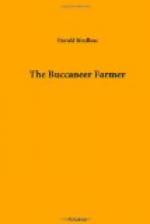The land was poor at the dale head, but there was better below, where the hills dropped down to the flat country, and, with the exception of Ashness farm, all was Osborn’s, from Force Crag, where the beck plunged from the moor, to the rich bottoms round Allerby mill. Unfortunately, the estate was encumbered when he inherited it, and he had paid off one mortgage by raising another. He might perhaps have used other means, letting his sporting rights and using economy, but this would have jarred. The only Osborn who bothered about money was his wife, and Alice was parsimonious enough for both. Money was certainly what his agent called tight; but as long as he could give his friends some shooting and a good dinner and live as an Osborn ought to live, he was satisfied. Still, Gerald must have his chance at Woolwich and this needed thought. Osborn felt he would like another drink, but glanced at his watch and saw that his visitors would arrive in a few minutes.
They were punctual and Osborn got up when his agent and another man came in. Hayes was tall, urbane, and dressed with rather fastidious neatness; Bell was round-shouldered and shabby. He had a weather-beaten skin, gray hair, and small, cunning eyes. Osborn indicated chairs and sat down at the top of the big table. He disliked business and knew the others meant to persuade him to do something he would sooner leave alone. This would have been impossible had he not needed money.
“Mr. Bell wishes to know if his tender for the Slate Company’s haulage is approved,” Hayes began. “His traction engine is suited for the work and he is prepared to buy a trailer lurry, which we would find useful in the dale. Mechanical transport would be a public advantage on our hilly roads.”
“It needs a good horse to bring half a load from station,” Bell interposed. “T’lurry would move as much in yan day as farmers’ carts in four.”
Osborn agreed. He was not much of an economist, but it was obvious that time and labor were wasted when a farmer took a few sacks of potatoes to the railway and another a sack of wool. There was no difficulty about the tender, because Osborn was chairman of the small Slate Company; the trouble was that the contract would help Bell to carry out another plan. The fellow was greedy, and was getting a rather dangerous control; he had already a lease of the limekilns and Allerby mill. But his rents were regularly paid, and it was an advantage to deal with one prosperous tenant instead of several who had not his punctuality and capital.
“The trailer would be useful if you decided to make the new terrace you thought about,” Hayes suggested. “The cost of carting the gravel and the slabs for the wall would be heavy; but I have no doubt Mr. Bell would undertake the work with the trailer on very reasonable terms.”
“I might forget to send in t’ bill. Yan good turn deserves another,” Bell remarked.
Hayes frowned. He had meant to imply something like this, but Bell was too blunt. For all that, Osborn was not very fastidious and had long meant to make the terrace when funds permitted. In fact, he hardly saw the thing as a bribe; it was rather a graceful recognition of his authority.




